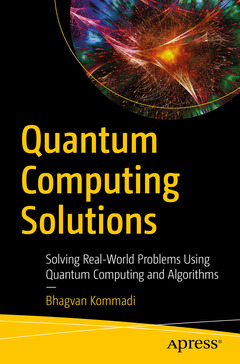Quantum Computing Solutions, 1st ed. Solving Real-World Problems Using Quantum Computing and Algorithms
Auteur : Kommadi Bhagvan

Know how to use quantum computing solutions involving artificial intelligence (AI) algorithms and applications across different disciplines.
Quantum solutions involve building quantum algorithms that improve computational tasks within quantum computing, AI, data science, and machine learning. As opposed to quantum computer innovation, quantum solutions offer automation, cost reduction, and other efficiencies to the problems they tackle.
Starting with the basics, this book covers subsystems and properties as well as the information processing network before covering quantum simulators. Solutions such as the Traveling Salesman Problem, quantum cryptography, scheduling, and cybersecurity are discussed in step-by-step detail.
The book presents code samples based on real-life problems in a variety of industries, such as risk assessment and fraud detection in banking. In pharma, you will look at drug discovery and protein-folding solutions. Supply chain optimization and purchasing solutions are presented in the manufacturing domain. In the area of utilities, energy distribution and optimization problems and solutions are explained. Advertising scheduling and revenue optimization solutions are included from media and technology verticals.What You Will Learn
- Understand the mathematics behind quantum computing
- Know the solution benefits, such as automation, cost reduction, and efficiencies
- Be familiar with the quantum subsystems and properties, including states, protocols, operations, and transformations
- Be aware of the quantum classification algorithms: classifiers, and support and sparse support vector machines
- Use AI algorithms, including probability, walks, search, deep learning, and parallelism
Who This Book Is For
Developers in Python and other languages interested in quantum solutions. The secondary audience includes IT professionals and academia in mathematics and physics. A tertiary audience is those in industry verticals such as manufacturing, banking, and pharma.
Part 1: Introduction
Chapter 1: Quantum Computing Solutions Overview
1.1 Real-Life Problems and Solutions
1.2 Solution Benefits
1.2.1 Automation of manual, semi manual processes
1.2.3 Cost Reduction and Improving Profit
1.2.3 Improving Efficiencies and reducing the defects
1.3 Solutions
1.3.1 Cryptography
1.3.2 Optimization
1.3.3 Cyber Security
Chapter 2: Mathematics behind Quantum Computing
2.1 Quantum Operators
2.2 Sets
2.3 Vectors
2.4 Matrices
2.5 Tensors
Part 2: Quantum Computing Basics
Chapter 3: Quantum SubSystems and Properties
3.1 Single Qubit System
3.2 Multiple Qubit System
3.3 Quantum States
3.4 Quantum Protocols
3.5 Quantum Operations
3.6 Quantum Transformations
Chapter 4: Quantum Information Processing Framework
4.1 Quantum Circuits
4.2 Quantum Communication
4.3 Quantum Noise
4.4 Quantum Error Correction
4.5 Limitations of Quantum Computing
4.6 Quantum Algorithms
4.6.1 Duetsch-Jozsa Algorithm
4.6.2 Simon’s Algorithm
4.6.3 Shor’s Algorithm
4.6.4 Grover’s Algorithm
4.7 Quantum Subroutines
Chapter 5: Quantum Simulators
5.1 Quantum Languages
5.2 Qubit Measurement
5.3 Quantum Instruction Sets
5.4 Full stack Universal Quantum Simulator
5.5 Quantum Assembly Programming5.6 Quantum Hardware Platforms
Part 3: Quantum Solutions
Chapter 6: Quantum Optimization Algorithms
6.1 Approximate optimization algorithms
6.2 Combinatorial Optimization
6.3 SemiDefinite Programming
6.4 Quantum NP (BQNP)
Chapter 7: Quantum Algorithms
7.1 Quantum Least Squares fitting
7.2 Quantum semidefinite programming
7.3 Quantum sort
7.4 Quantum Eigen Solvers
Chapter 8: Quantum Neural Network Algorithms
8.1 Quantum ANN
8.2 Quantum Associative Memory
8.3 Quantum Dots
8.4 Quantum Random Access Memory
8.5 Quantum GAN
Chapter 9: Quantum Classification Algorithms
9.1 Classifiers
9.2 Support Vector Machines
9.3 Sparse Support Vector machines
Chapter 10: Quantum Data Processing
10.1 Quantum K-Means
10.2 Quantum K-Medians
10.3 Quantum Clustering10.4 Quantum Manifold Embedding
Chapter 11: Quantum AI Algorithms
11.1 Quantum Probability
11.2 Quantum Walks
11.3 Quantum Search
11.4 Quantum Deep Learning
11.5 Quantum Parallelism
Chapter 12: Quantum Solutions
12.1 Traveling Salesman Problem
12.2 Scheduling
12.3 Fraud Detection
12.4 Distribution solutions
Chapter 13: Evolving Quantum Solutions
13.1 Quantum Annealing
13.2 Quantum Key Distribution
13.3 Quantum Teleportation
Chapter 14: Next Steps
14.1 Best Practices
14.2 Case Studies
14.3 Quantum Computing News Sources
14.3 Quantum Ware - Future
Bhagvan founded Quantica Computacao, the first quantum computing startup in India. He has engineered and developed simulators and tools in quantum technology using IBM Q, Microsoft Q#, and Google QScript. The company's focus is developing quantum cryptographic tools to provide quantum proof data security, which will help banking institutions protect their transactions. He is now Director of Product Engineering at Value Momentum. Value Momentum has a social network for doctors (White Coats) and provides telehealth support through the Practice Plus suite of products and services.
Bhagvan has published papers and presented at IEEE, AstriCon, Avios, DevCon, PyCon, and genomics and biotechnology conferences on topics including adaptive learning, AI Coder, and more. He is a hands-on CTO who has been contributing to open source, blogs, and the latest technologies such as Go, Python, Django, node.js and Java, MySQL, Postgres, Mongo, and Cassandra. He is the technical reviewer for the book Machine Learning with TensorFlow. He has written the book Hands-On Data Structures and Algorithms with Go and Paytech and The Payment Technology Handbook for Investors, Entrepreneurs, and FinTech Visionaries.
Teaches you how to design and develop your own quantum solutions
Shows you how to implement popular quantum algorithms in an appropriate context in real life
Demonstrates how quantum algorithms speed up machine learning and algorithms compared to classical ones
Date de parution : 12-2020
Ouvrage de 300 p.
17.8x25.4 cm
Disponible chez l'éditeur (délai d'approvisionnement : 15 jours).
Prix indicatif 47,46 €
Ajouter au panier


